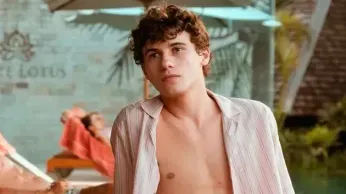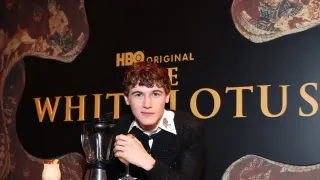
4 hours ago
‘White Lotus’ Star Sam Nivola Opens Up to Variety About His Favorite NYC Bathhouse Escape
READ TIME: 13 MIN.
Sam Nivola, catapulted to stardom through his compelling performance in season three of HBO’s “The White Lotus,” embodies a new generation of actors navigating the convergence of overnight fame, heightened scrutiny, and the evolving conversation around LGBTQ+ representation in media. In a recent cover interview for Variety’s Power of Young Hollywood issue, Nivola reflected on his journey post-“White Lotus,” the emotional toll of internet discourse, and how he seeks solace in the unique spaces of New York City—including a cherished bathhouse that has become something of a retreat for the actor .
Nivola’s portrayal of Lochlan Ratliff garnered both acclaim and controversy, particularly following a shocking scene involving his on-screen brother, played by Patrick Schwarzenegger. The internet response was swift and, at times, harsh, with Nivola sharing the pain of seeing his character labeled with words like “monster” and “pervert.” In his own words: “It was at times painful. It’s hard when people view your character as a monster or pervert or freak… It was hard feeling like people had lost sympathy for this guy that I lived inside. I got a little defensive. You have to love your character, otherwise you’re fucked. My character jerked off Patrick. I don’t like that. It’s a bad thing he did. But I try not to pass judgment” .
This moment, he says, forced him to reckon with the internet’s power to reduce complex performances to viral soundbites—often stripping away nuance and empathy. For Nivola, keeping a sense of self amid these waves of attention has become a central challenge.
Nivola credits “The White Lotus” with transforming his career, recounting how he “literally couldn’t walk down the street in Brooklyn—my hometown—without being swarmed” at the height of the show’s popularity. Yet, with success came a new obstacle: the risk of being typecast. “I’m starting to feel a little boxed in by the characters I’ve played in my career. But I’m also finally getting offers to do things where I’m a little more grown up. Hopefully the next one will be something a little different” .
He also discussed the state of Hollywood, expressing concerns over the industry’s reluctance to take risks and the prevalence of data-driven decision-making. “They’ve ‘Moneyball’-ed the film industry! Everything is about data now—and trying to predict, to the nearest dollar, how much money a movie’s going to make. It screws the idea of risktaking, and comedy is more about risktaking than any other genre” .
Nivola’s role in “The White Lotus,” a series renowned for its queer storylines and diverse representation, propelled him into LGBTQ+ conversations worldwide. As reported by OUT Magazine, Nivola noted his direct messages were “flooded with thirsty older men” following the series’ airing, reflecting both the adulation and objectification that can come with newfound sex symbol status .
While Nivola’s own sexuality remains private, he has welcomed the opportunity to participate in queer-positive narratives and acknowledges the importance of authentic representation. “It’s really powerful to see queer storylines treated with respect and complexity. I feel lucky to be part of that conversation” .
Amid the intensity of public life, Nivola has found comfort in the communal, body-positive atmosphere of New York’s bathhouses. In a recent video, filmed during his latest visit and shared as part of a “This or That” segment for Variety, he described the bathhouse as a beloved escape. “It’s one of the few places in the city where you can just relax, be yourself, and not worry about who’s watching. There’s no pressure—just community, comfort, and a sense of belonging” .
For many in the LGBTQ+ community, bathhouses have long served as vital spaces for connection, rest, and self-expression. Nivola’s public embrace of these venues serves as a subtle affirmation of their ongoing cultural relevance, especially in a city with deep queer history. “If I’m feeling overwhelmed, or just need to unplug, I’ll head to the bathhouse. It’s where I can breathe” .
Though Nivola’s parents, actors Emily Mortimer and Alessandro Nivola, are both established in the industry, he is quick to assert his independence. “Other than my genes, I don’t think I can attribute much of my success to my parents. I feel proud that I’ve done it for myself, and sometimes in spite of them… I didn’t want to give anyone an excuse to be able to say that anything I’ve achieved has been because of anyone other than me. And I’m proud of that” .
As Sam Nivola navigates the aftermath of viral fame, he remains committed to seeking roles that reflect greater maturity and depth. He continues to advocate—through his words and personal choices—for spaces that honor individuality and support marginalized communities. For fans and observers alike, his story underscores the ongoing importance of queer visibility, the value of safe communal havens, and the challenges of forging an authentic path in an industry defined by spectacle and scrutiny.






